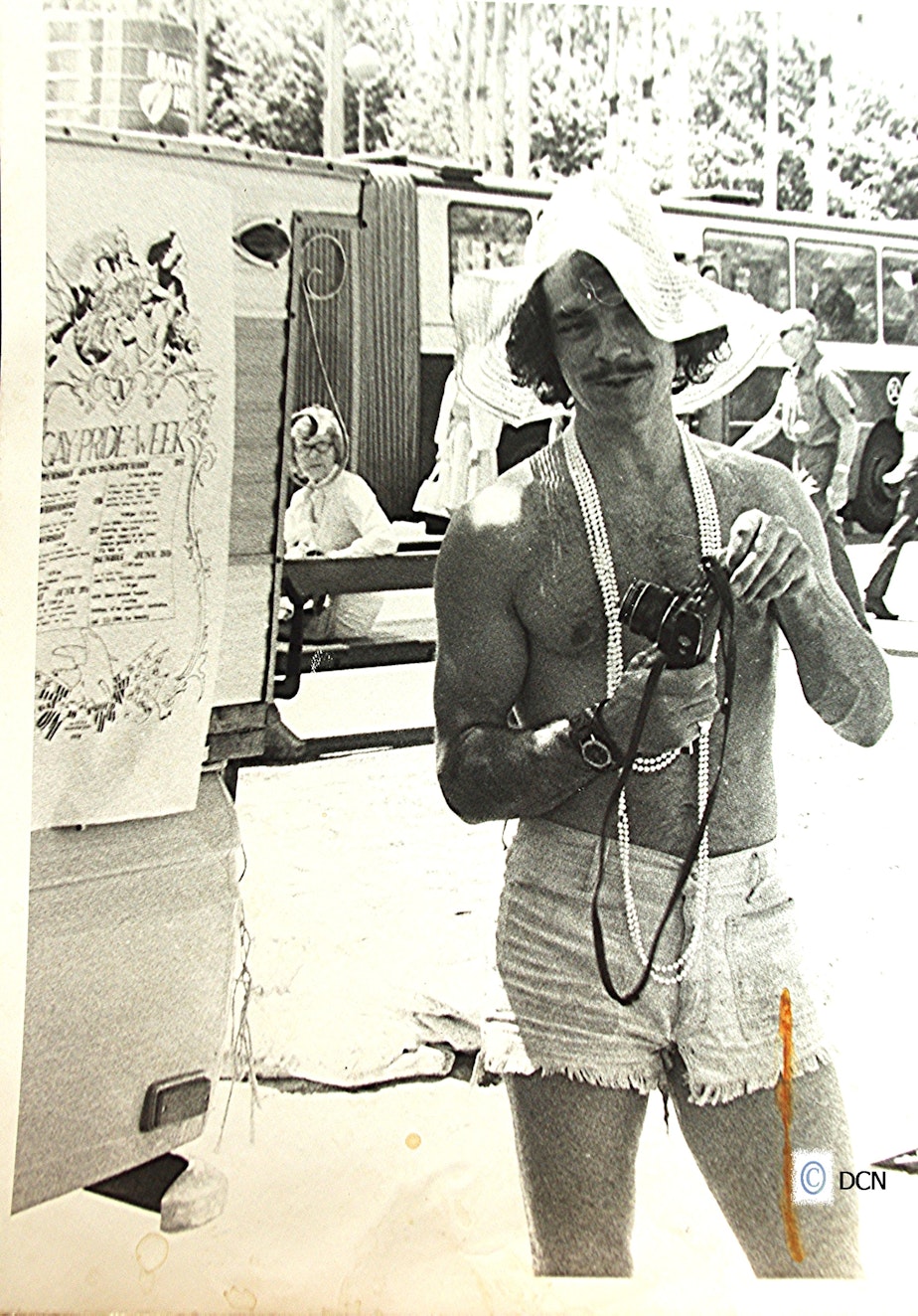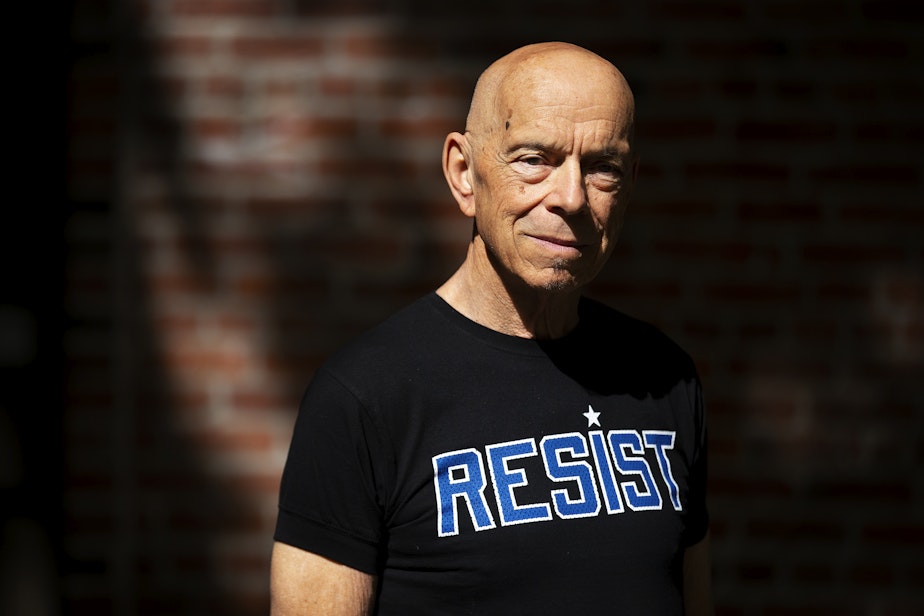50 years of Pride in Seattle: The early days of the LGBTQ+ fight for acceptance

It's a summer afternoon in Seattle. The sun is shining down on an eclectic group of people gathered in Occidental Square.
A woman smokes as she sunbathes. A man sporting a handlebar mustache, cowboy hat and boots leans back slightly, as if laughing. Someone plays a harp. There are denim shorts everywhere.
It's June 1974, at Seattle's first Pride week celebration.
"The Seattle City Council had just passed, the previous year, one of the first ordinances in the United States prohibiting discrimination for gay employment," David Neth recalled. "But it was not widely known. The gist of the times was if you were out, that was going to be a problem."
That didn't stop a group of about 200 LGBTQ people from coming out to Occidental Park that day for a picnic and a street dance party later that night.
Neth was one of the organizers behind Seattle's first Pride, a celebration that was not yet recognized by the city. He returned to the site of that historic gathering with KUOW this week to mark 50 years of Pride celebrations in Seattle.
RELATED: At 50, Seattle Gay News starts a new chapter
"It tended to be a younger crowd because we had the least to lose," Neth said of the 20-somethings who made up most of the first Pride revelers. "It was sort of the leftover hippie-type crowd, only the gay version of it."
Sponsored
This first Pride, though big in spirit, was minuscule compared to what it has become today. Neth and others planned just one week of events — with a budget of about $580 — and they had no idea who would have "the guts to come out." It didn't matter, though.
"We were out in public, in the daylight," he said.
For a young man like Neth, that was enough.

Just a small town boy
Sponsored
Neth grew up in a small Pennsylvania town, in a Christian household in which he was "very closeted."
"I viewed my life is ending at the age of 20-something, because that's what happened with gay people back then," he said. "Or that's the way you were led to believe."
He became a national park ranger, moving to Mount Rainier as a seasonal worker in 1972.
"Eventually, I left the bears in the woods for the bears in Seattle," he quipped.
Neth moved to Seattle's Capitol Hill neighborhood in 1973 — the year the City Council prohibited job discrimination on the basis of sexual orientation — and his world changed. He found a community through the Seattle Counseling Center for Sexual Minorities, the first of its kind in the U.S.
RELATED: Seattle's queer history. Out from the underground
"I went there not knowing anyone in the city, and all of a sudden, I saw this whole group of people that were happy and healthy and interacting and positive and energetic," Neth said. "At some point, I went from the view of my life as ending in my 20s to seeing myself as an old man."
Fifty years later, that vision has become a reality. Neth is still trucking.
Sponsored

Now in his 70s, Neth only got more involved in his community from there. He recalled starting a 24-hour hotline to report "gay bashing" "because the police reactions weren't always the best." He described the community as "insular" at the time, largely centered on Capitol Hill, a space where he and his partner could hold hands and just be in public.
Sponsored
It wasn't so easy for everyone, though.
Neth said some people were still afraid show themselves in the broad daylight — and not without good reason.
RELATED: As a teen, they found belonging at this LGBTQ+ youth center. Now, they're paying it forward
"I was most afraid of the police," Neth said of that time. "I had been arrested for jaywalking, supposedly, arrested and taken into the police station. Obviously, they had targeted me. This was when we were doing the Gay Pride stuff. And as we're walking down the hall, officers passing would mutter 'faggot' as they passed by me. So, obviously, they knew who I was and what was going on. The police were not our friends."
It was harder to find friends period — to find allies — outside of the community then.
Sponsored

Neth still has a copy of their budget, detailing income and expenses for the Pride celebrations. According to the document, the organizers held a bake sale that netted just $12. Loans from members of the community, including Neth, totaled $130 of the $588.51 they had for the week.
Even on a shoestring budget, the community celebrated all they had fought for and all that had yet to come.
"We were fighting for acceptance," Neth said.
Growing Pride
In the years after Seattle's first Pride celebration, Neth watched as LGBTQ people across the country had their "Rosa Parks moment," a shift in the national awareness.
It wasn't perfect. Neth noted it was Gay Pride in the early days, a term gay men may have felt was all-encompassing but left lesbian women and others feeling unnamed and left out. A banner captured in the photos above shows a concerted effort to be more inclusive during the 1974 festivities. The hand-painted banner proclaimed, "Proud to be LESBIAN. Proud to be GAY."
There were few transgender people involved — at least as far as they knew — in 1974.
Much has changed in the last 50 years.
RELATED: The many glowing faces of Seattle Pride
"The essence of what we're doing at Pride is still about joy and celebration and being out in the sunshine," said Patti Hearn, executive director of Seattle Pride today.
As awareness grew from the first Pride in 1974, so too did the size of the celebrations. Hearn said about 300,000 people now participate in Seattle. Compare that to the 200 people who were at the first Pride picnic.
It's also "more mainstream," Hearn noted — even though LGBTQ+ communities still face discrimination today, with trans people in particular being targeted in state legislatures — and we now celebrate Pride Month, not just one week of Pride.
With more participants comes more financial support, too, from small businesses to corporate sponsors. The days of putting together Pride with a budget of less than $600 are long gone. Today, Pride in Seattle costs hundreds of thousands of dollars, Hearn said.
It's bigger than that, though. It's more than a budget or a headcount.

This will be Hearn's 30th Pride in Seattle, her first as executive director. It's a milestone for her as well as for Pride itself, and that's special.
"Fifty years is a long time. We always knew this, but it indicates to everyone else that we're not going anywhere," Hearn said.
RELATED: Gay veterans discharged under 'Don't Ask, Don't Tell' could have benefits restored
This year's anniversary is a chance to honor people like Neth, she said. "People who showed up in the 70s and said, 'We're not going to take this anymore. We are no longer willing to be in the shadows. And we have as much right as anybody else to live our lives and be accepted and have all the same rights.'"
It's been a long road to get here, she acknowledged, and there's more work yet to be done.
"The march literally continues," she said, "and needs to."






